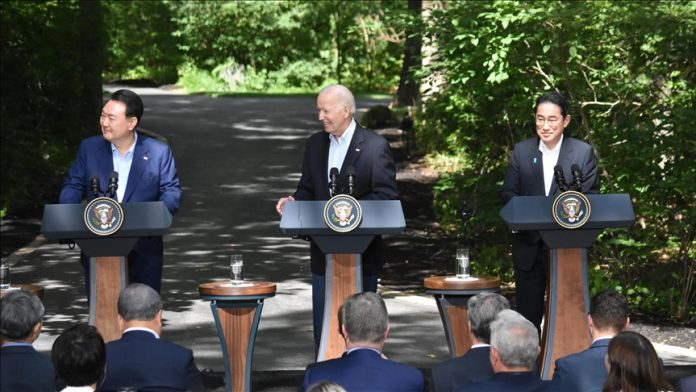Leaders of the United States, South Korea, and Japan stated on Friday that they reject China’s “dangerous and aggressive behaviour” in support of “illegal maritime claims,” while promising to deepen economic and security relations.
Following a Camp David summit in the US state of Maryland, US President Joe Biden, South Korean President Yoon Suk Yeol, and Japanese Prime Minister Fumio Kishida agreed measures to improve cooperation. The meeting, which coincided with Biden’s diplomatic drive to enhance relations between Seoul and Tokyo, was the first to take place at Camp David since former President Barack Obama welcomed Gulf Arab leaders in 2015.
“We are resolute in our determination to uphold regional security, strengthen Indo-Pacific engagement and promote common prosperity,” the leaders said in a statement.
“Recalling the publicly announced position of each of our countries regarding the dangerous and aggressive behavior supporting unlawful maritime claims that we have recently witnessed by the People’s Republic of China (PRC) in the South China Sea, we strongly oppose any unilateral attempts to change the status quo in the waters of the Indo-Pacific.
“In particular, we steadfastly oppose the militarization of reclaimed features; the dangerous use of coast guard and maritime militia vessels; and coercive activities,” it added.
The statement expressed concern about North Korea’s “illicit cyber activities” and ballistic missile programs and condemned its “unprecedented number of ballistic missile launches”.
“Furthermore, we reaffirm our commitment to the complete denuclearization of the Democratic People’s Republic of Korea (DPRK) in accordance with relevant UNSC resolutions and urge the DPRK to abandon its nuclear and ballistic missile programs,” it said. “We call on all UN Member States to fully implement all relevant UNSC resolutions.”
The three countries also were united in their support for Ukraine, it said. “We reaffirm our commitment to stand with Ukraine against Russia’s unprovoked and brutal war of aggression that has shaken the foundation of the international order.”
They agreed to consult with each other “to coordinate our responses to regional challenges, provocations, and threats that affect our collective interests and security.”
Biden said at a news conference that the US’ commitment to both countries is “ironclad,” adding: “And my personal commitment to bringing these three nations together was real from the very beginning.”
He said they agreed to elevate trilateral defense cooperation in the Indo-Pacific region, including launching annual multi-domain military exercises, bringing trilateral defense cooperation to “unprecedented levels.”
“We’re doubling down on information sharing, including on the DPRK (Democratic People’s Republic of Korea) missile launches and cyber activities strengthening our ballistic missile defense cooperation,” he said.
Biden said they are also expanding economic cooperation.
Yoon said the top officials from the three countries, including foreign ministers, defense ministers and national security advisors, will meet every year to closely coordinate trilateral cooperation.
He added that holding trilateral defense exercises is crucial in countering North Korea’s nuclear and missile threat.
Kishida said the three will promote multi-layered cooperation at all levels.

